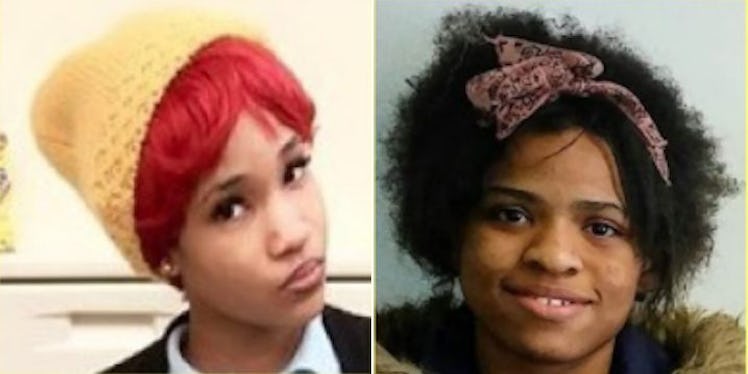
Over 20 Black Girls Have Gone Missing In DC, Here's Why It Matters
Black women on Twitter come through in the clutch once again.
Several black teen girls have been reported missing in the Washington, DC area, while the media has covered them minimally... until Black women on Twitter began voicing their concerns in droves.
Twitter user Black Marvel Girl was one of the first to jumpstart the now-viral conversation with a repost to her 15,000 followers of the missing black girls' photos from the Metropolitan Police Department.
The post was one of many by frustrated black women who feel they are the only ones who care to highlight when young black girls go missing.
A major concern voiced on Twitter is the AMBER alerts.
Many feel they rarely receive AMBER alerts for missing black children.
Elite Daily spoke with James Goodwin, a representative of the Office of Justice Programs (OJP).
The organization oversees training for AMBER alert programs in each state and collects AMBER alert reports from the National Center for Missing & Exploited Children (NCMEC).
Goodwin points out that,
While we certainly cannot speak for individual states, the 2015 AMBER Alert report shows that some 54 percent of alerts issued in 2015 were for “non-white children.”
The report also shows that 182 Amber Alerts were sent out in all of 2015. 31 percent the of them were for black children.
To put it all in perspective, out of the 460,699 missing children reported in 2015 (according to NCMEC) -- only a handful of them made it to the Amber Alert stage, because not all of them fit the strict criteria for activation.
Basically, the Amber Alerts aren't just rare for black kids. They're rare, period.
And that still doesn't mean we don't have a problem when it comes to black girls and women going missing.
Twitter users are holding media responsible for underreporting.
The DC Police Department confirmed to NBC that the number of missing black girls has not increased.
Metropolitan Police Department spokeswoman Rachel Reid told NBC Washington,
We've just been posting them on social media more often.
But people seem more outraged about the missing reports not being covered in the news as much, and the fact that they have to learn of them via social media.
Residents are also concerned about the DC Police Department.
The list of missing person cases hasn't been updated, although at least one missing teenager, Chareah Payne, has been found.
A tweet from the department was sent out, but does not reflect the change.
Niki Irene, a 32-year old DC resident who works as a crisis placement advocate for survivors of sex trafficking, says the slight lag in updates happens regularly and doesn't keep the public as informed as they could be.
She tells Elite Daily,
I view the missing persons list a couple of times a week and I'll notice that it'll say, 'current as of' and it will always be a couple days prior to when I'm looking at it. Today, when I was looking at it and it says 'Current as of 3/22.' It's now 3/24. Why do you have people on staff to handle things like that if you're not going to keep it updated constantly?
Irene also discussed the toll that underreporting takes on the survivors she works with, saying,
A lot of the girls that I work with, they feel ignored and forgotten. They feel like [the media] doesn't care. Nobody wants to hear about a bunch of poor missing black girls because we are seen as less than.
To be clear, none of the missing girls in DC have been linked to sex trafficking, but these survivors provide insight on what it feels like to be missing with few people, if anyone, looking for them.
And the media, government agencies and police department do not shoulder all of the blame for the lackadasical attention paid to missing black girls.
Nobody wants to hear about a bunch of poor missing black girls because we are seen as less than.
The general public is responsible, too.
Dismissive skepticism and silence on Twitter sit right next to the outrage about the black girls who have gone missing in DC.
People have to change their overall attitude towards black girls for missing black girls to matter.
There were way too many tweets questioning why we are focusing on black girls, and way too many posts that wrote these missing children off as troublemakers who likely just ran away.
Yes, but missing is missing, no? A child who was kidnapped may sound like a more endearing story, but runaways need help, too.
Black girls are rarely allowed to be victims who feel pain, and when we are, it is rationalized that we deserve it or caused it.
When black girls aren't blamed, we are ignored altogether -- even by groups that declare they are down for our cause.
People have to change their overall attitude towards black girls for missing black girls to matter.
The missing girls in DC are also another example of why many black women see feminism as empowerment for only white women, and reject it.
This month, we celebrated International Women's Day with "A Day Without Women." In January, droves of white feminists, along with women of color, flocked to our nation's capital to make a statement to the Trump Administration that violence against women and girls is unacceptable. Pink pussy hats and signs in tow.
Now that black women and girls -- who experience sexism and racism in tandem -- need help, the majority of people on Twitter making noise are other black women. Business as usual.
It is the job of the media, government officials, law enforcement and everyone in between to step up more for marginalized groups like this.
Silence isn't going to get any of these missing girls back home safely.